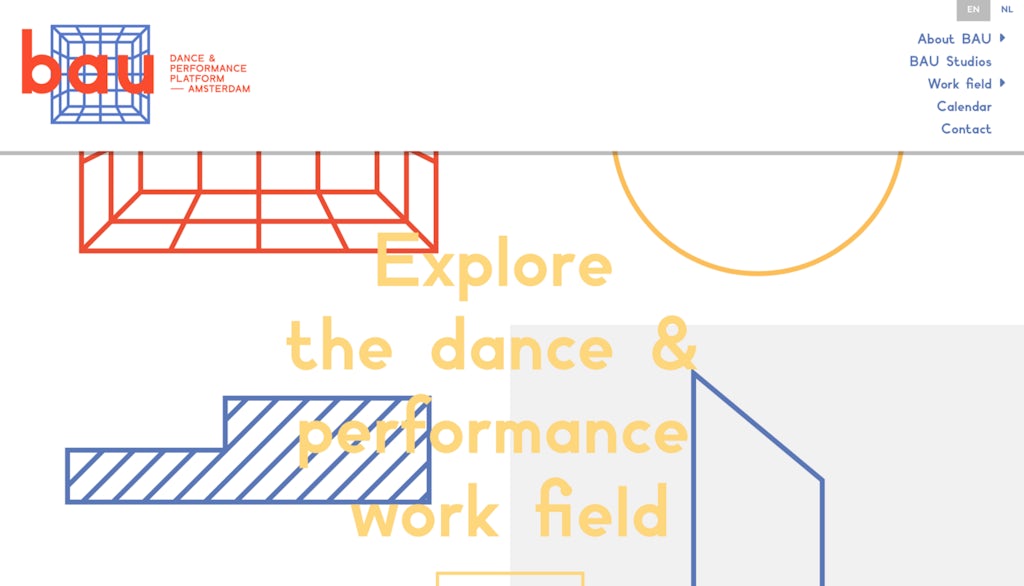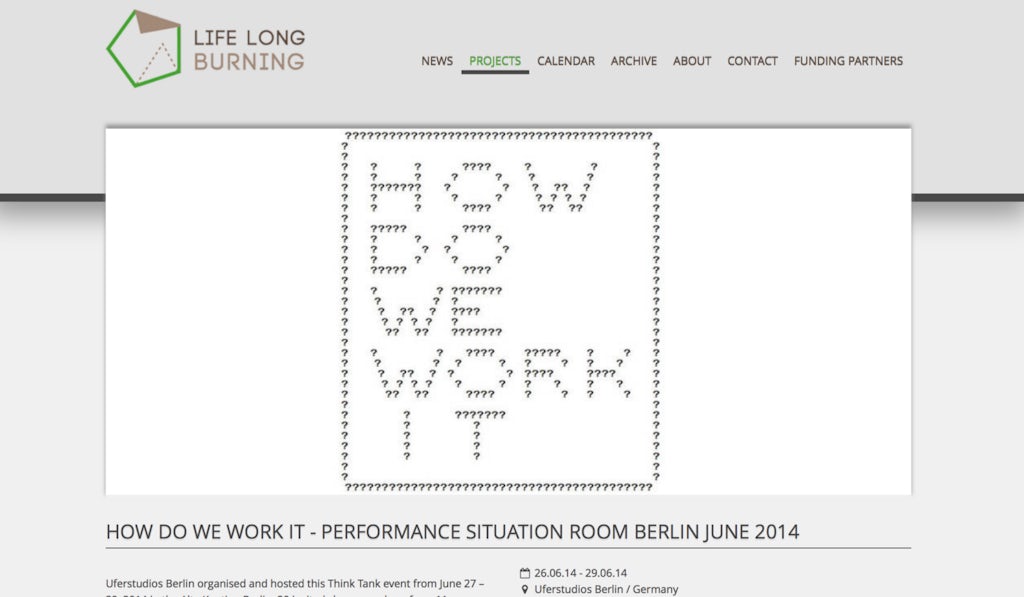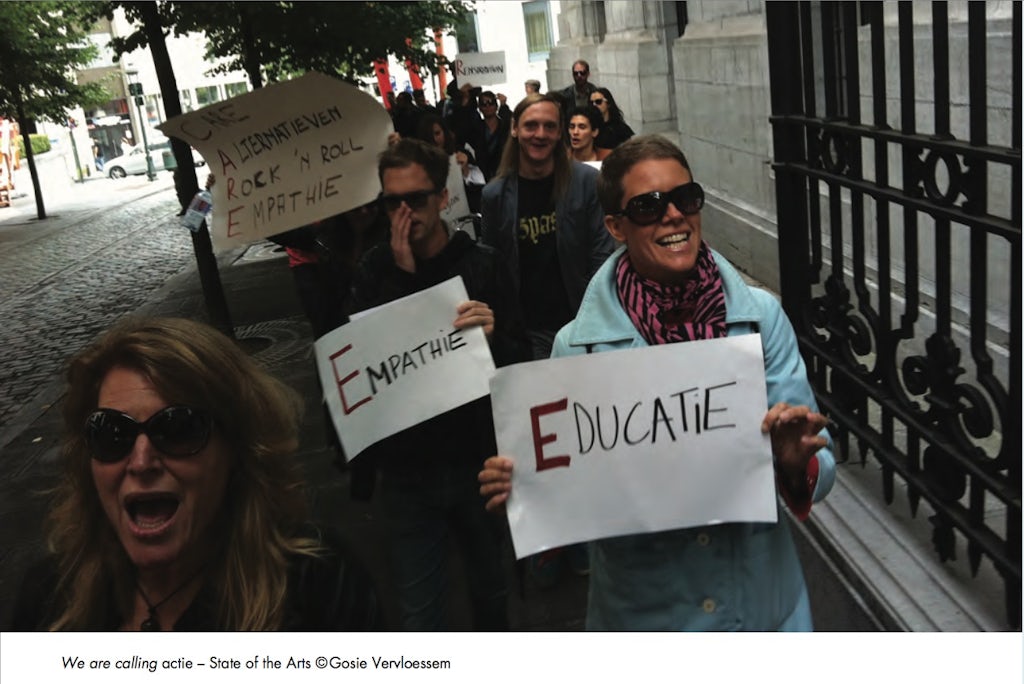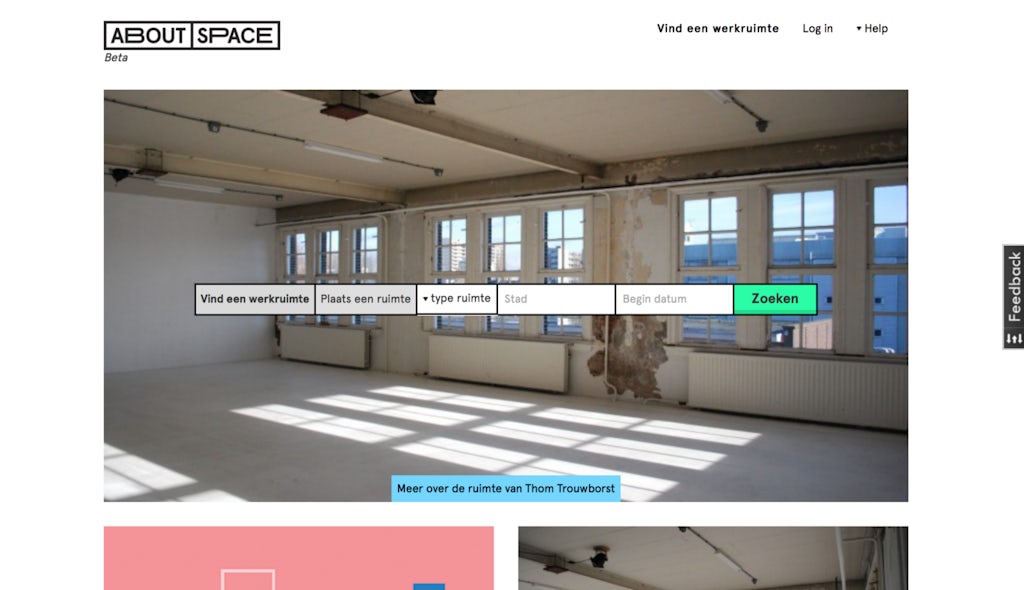
Freedom and Frenzy — Share your Experiments to Strengthen the Position of Artists
Starting a collective mapping of solutions to the precarious position of artists at the IETM meeting in Bucharest (21/04/2017)
Low incomes, juggling jobs, uncertain futures, and a constant need to be social, available and willing to move: it is fair to say that performing artists live in precarious conditions.
So many research has been done about the topic, also by Flanders Arts Institute. Late 2016 we published the result of a large scale survey about the income of artists in Flanders. Also in the context of our R&D-trajectory Reframing the International, we paid attention to the precarious position of transnational artists. Anton Bulayev gave an excellent keynote at a conference we organised in Bruges, titled ‘Freedom and Frenzy’. He said:
There are bleak realities behind the façade of some performing and visual artist’s successful international careers: the manic, frenzied life, the insecurity and fear of hyper-mobility and residency- or studio-hopping. What are some of the strategies to have more sustainability in artists’ working conditions? Band-aid solutions might be short-sighted. It is time for a radical re-imagining of the system.
But what can be done? How can the position of artists in the field be more sustainable? What will this new, alternative and bright system look like? How to start this paradigm shift?
In fact, this system shift may already be happening today. So many individuals, organisations, artists and art workers from across Europe are responding with a multitude of initiatives that span across funds for artists with families, artist lobby organisations, alternative currency systems, space sharing platforms, fair practice labels, and more. At the same time , there is no list or clear overview of all these initiatives. There is a lot of research and reflection about the issue, but it’s difficult to get an overview or keep track.
That is why Anton Bulayev, Delphine Hesters and I are taking initiative to create a space where this information can be shared, both live and online. For one, we’re launching the Freedom & Frenzy Facebook Group, where everyone with an interest in this matter can learn about and share relevant examples.
And if you want to discuss this issue ‘live’; next Friday, we’ll be hosting a session at the IETM Plenary Meeting in Bucharest. Hosted by Flanders Arts Institute, this session will map existing initiatives and collect methods of exchanging experiences.
In order to prepare the Bucharest session, in this blogpost Delphine, Ash and myself, already share a number of relevant examples and initiatives we came across the last couple of months. Compared to the Facebook group, we already add a first layer: a preliminary structure to cluster or group some initiatives we came about. It’s only a start and certainly not complete. But this can develop into a relevant resource, if the many people working in this area share their knowledge and experiences.
So, again: please comment, add, react and reflect… both on the Freedom and Frenzy Facebook group and below, in the comments. We’ll keep updating this feature, integrating new initiatives and insights.
1. Initiatives organizing the artist community in order to give voice, to share, to challenge individualism

BAU (Amsterdam)
BAU is an organization/a platform for the independent dance and performance scene of Amsterdam. Our aim is to initiate activities, gather and disseminate information, bring people together, improve the conditions for this group, form partnerships with other cultural institutions/initiatives in the city and be a voice for the independent scene. With these activities we hope to contribute to the development of the dance and performance in Amsterdam and abroad.
In addition to representing Amsterdam’s independent dance and performance scene, offering advice, renting out two rehearsal studios, and being a think-tank, BAU organises a range of activities. These activities are aimed at strengthening networks, facilitating independent dance makers and stimulating exchange. They include: the BAU website, a dance and performance agenda, BAU try-outs, ‘Tax together’ meetings etc.

How Do We Work It (Berlin)
Uferstudios Berlin organised and hosted this Think Tank event from June 27–29, 2014 in the Alte Kantine Berlin. 20 invited choreographers from 11 different countries were informed about the design thinking method as a tool to analyse and compare artistic working methods. The wish to share working methods and develop better working conditions continued after the first workshop with monthly meetings and activities like establishing a “shared office” for writing applications together and a “reading group” to enlighten the work with theoretical input. The session was conceptualized by Daniel Almgren Récen, Barbara Friedrich and Jörg Koslowsky and moderated by Design Thinking Methodology.
The session aimed for exchange on production strategies of individual artists, by using the provocative question: What is the ideal production strategy? Realizing fully there is no such thing within the performance arts, the idea behind such a challenging question was to go beyond the existing modes of production and avoiding sticking too much to the reality of our times and the conditions we come to know.

SOTA (State of the Arts) (Brussels)
SOTA is an open platform of artists, artist initiatives and other people committed to a healthy climate for the arts in society. In the past, it set up a number of symposia in which important issues have been tackled with regard to the arts in society and the position of the artists in the field. SOTA works without any financial means and functions as a fluid network of individuals with -more or less- common goals. Even though it struggles to find continuation, it has been able to give a voice to independent artists and work on agenda setting with regard to e.g. the need for shared ‘fair practices’ in the arts field.
2. Re-valuing non-economic currencies — sharing resources

AboutSpace (the Netherlands)
About Space is a sharing platform, where you can sublet own space (temporary) or where you can rent creative flexible workspace. AboutSpace gives the arts and creative industries a valuable overview of available and used studio’s and workspaces in the Netherlands and increases their findability and occupation.
In the end, we:
- make creative work spaces visible
- allow users to save time finding the right space
- facilitate the actual usage of existing space
- through temporary rental allow owners to get a certain income to keep up with the costs of owning space
- facilitate and strengthen the self-organisation and independence of creative workers — allowing them to find the right conditions to set up their practice
RTMark receives project ideas from internet users, then lists them (here). Each listed project has its own discussion list (linked from the project). When a project requires a bit of funding to be accomplished, sometimes investors will step up to the plate and offer their help. Even more often, people will offer non-financial help or feedback.
at the studio enables the booming demand for sharing creative spaces around the world. The studios decide what they offer: from a simple workspace to creative encounters or even a workshop.
Timebank.cc is a Community Currency, accessible to everyone, to share skills and knowledge. Trade services with other Timebankers in exchange for time instead of conventional money. One Timebank Hour equals exactly one hour of work.
Timebank exchanges are more useful than direct person-to-person trades: the time you first earned by helping Anna, you can later spend for Michael to help you. Our biggest community of users lives in the region of The Hague, but we’re also active in Amsterdam, Brussels and Lisbon. (Over 1000 registered users).
We are an open platform that facilitates and encourages user-initiated projects on parallel economies. Timebank combines the advantages of modern technology with the communal principles of living together and sharing. The services for which the Timebank mediates range from piano tuning to programming web applications, from bicycle repair to business consultancy. The community has grown into an active network of over 900 users (June 2013), a number that is increasing with 20 to 30 new members every month. Timebank.cc is the biggest and fastest growing community currency in the Netherlands.
3. Strengthening the artistic peer sphere
P.A.F. (Reims, France)
PAF (=PerformingArtsForum) is a place for the professional and not-yet professional practitioners and activists in the field of performing arts, visual art, literature, music, new media and internet, theory and cultural production, and scientists who seek to research and determine their own conditions of work. PAF is for people who can motorize their own artistic production and knowledge production not only responding to the opportunities given by the institutional market.
Initiated and run by artists, theoreticians and practitioners themselves, PAF is a user-created, user-innovative informal institution. Neither a production-house and venue, nor a research-center, it is a platform for everyone who wants to expand possibilities and interests in his/her own working practice.
PAF is a open and relatively free site (and) / PAF is a nomadic space / PAF tries to stay cheap / PAF has almost no staff. (When PAF would have a staff, the prices would be much higher and the highly appreciated autonomy offered to the participants now would be strongly limited. PAF would no longer make a difference but would become a normal well organised artists residency, where space and material belong to the staffs responsibility.)
The highly appreciated autonomy can only be maintained when everybody takes part in the every day maintenance organisation.
To say it differently: Make it possible for others, not by retreating, not by withdrawal, or by being modest, on the contrary, making it possible for others is thought as active participation. Through action one offers and opens spaces in which others can take part. One proposes participation in an open rehearsal, a lecture, a conversation, a film or documentairy showing and/or by cleaning up and maintening general space. In other words: one does. This makes that the doer decides at PAF.
The AWARD (New York, U.S.)
THE AWARD, is an independent artist to artist mentoring initiative based on the goodwill of New York City’s experimental dance community. Its ambition is to strengthen our most important asset: individual artists and the connections between them. Highlighting dance’s embodied economy of direct relationships, THE AWARD invites gifted dance experimentalists to come together with highly regarded contemporary performance artists for a year of creative collaboration in a one-on-one mentoring partnership.
Neither monetary nor project based, THE AWARD is a relationship- building opportunity intended to provide recipients with access to aesthetic, professional, and practical knowledge in a holistic manner through mentorship. It is a year-long program of shared rehearsals, research and performances; reviewed proposals and budgets; dinners, networking, and advice on best practices, at the end of which the artists are asked only to describe their experience.
4. Fair practices in the arts
Veem Huis for Performance as the “100-Day house”
From the Press Release of 13 October 2016:
“In the next four-year arts funding cycle, Veem House for Performance has taken the radical step to — instead of being open the whole year — become a House for Performance for one hundred consecutive days per year. This amendment to the business plan, which takes effect from 1 January 2017, will allow Veem House for Performance to maintain its high standards despite restricted funding. In this way Veem will manifest itself in condensed form without compromising on quality and while staying true to the vision it outlined in its submitted plans. (…)
In its allocation of subsidies for 2017–2020, the Amsterdam Fund for the Arts (AFK) rated Veem very highly as production house for dance and performance, and acknowledged its importance as an innovative establishment on account of its new leadership and its curatorial proposals. However, despite this recognition, the Veem was allocated only a minimal increase in funding in the coming years — a substantially lower amount than was requested. (…)”
“The 100-Day House will be a recurring House for Performance that operates during an intensive and suitable period of the year, and is based on fair practice. This proposal allows the organisation to choose quality over quantity without compromising the production and working conditions of artists and professionals in the cultural field. It also means Veem will cease to exist in its current form, and become project-based. Throughout the rest of the year the space will be used by artists and become an incubator for the development of new ideas.”
5. Work-life balance — artists as human beings
Sustainable Arts Foundation Fellowship for artists who are parents
With the help of funding from the Sustainable Arts Foundation, Gallery Aferro offers this open call to all artists that are parents* and would like to continue their creative practice in an engaged and energized studio residency in downtown Newark, NJ. The studio will be provided to the parent for 6 months at no cost and will come with a $1000 stipend given at the beginning of the 6-month rotation. The stipend and free studio will facilitate the parent-artist in coordinating effective time and energy to be spent in their studios.
Family-in-residence program at FoAM, Brussels
Residency programmes are often designed for itinerant solo artists or artists’ collectives. In discussion with artists who have young children, we became aware that it is often difficult to find opportunities where they can participate in residencies along with their kids. We thus began an experiment in 2010 that sought to explore how a “family in residence” would look — one in which children become an intrinsic part of the workspace.
The separation between life and work wasn’t common practice before the industrial revolution. Now in postindustrial societies such a separation may not be ideal either: working parents who see their children only a few hours a day; expatriates and immigrants who have no families to support them; eco-communities in search of new forms of sustainable living for all ages…
At FoAM we recognise the need and added value of hybrid forms of life and work to support artists. We make arrangements with the families in residence that give the parents the opportunity to focus on their work, while FoAM’s collaborators help with looking after the children.
Read more about FoAM’s families in residence on the Libarynth.
NOTE: This programme ended in 2016.
6. Breaking taboos
DILEMMA IN ART Competition
a project by artists Maria Guggenbichler & Rosalie Schweiker — an open call / prize.
The aim of the competition is to make individual experiences of everyday dilemmas a common concern.
We would like to hear examples of structural, existential, tedious or irresolvable dilemmas which you encounter in your working life as an artist, curator, cultural producer or audience. The submission with the most apt description of a complex and distressing dilemma will win a glittering cash prize of £300.
Idleness Academy 2015 by Alexander Skidan/Olga Jitlina/Emily Newman
“Nowadays when “independent” artists become subjects and actors of the precarious economy, their art is subjugated to multiple simultaneous projects, deadlines, the principles of networking, PR and self-promotion to such an extent that it almost totally formats their art. In this crazy gallop, at some point management or self-management, can even substitute for art itself. Experiencing constant stress and frustration, artists turn into nervous workaholics not able to relax and enjoy anything besides their professional interests.”
In order to rescue Art, Artists and maybe Time itself from the accelerated modes of production we have decided to promote and hopefully practice Idleness as a potential alternative mode where art can hide and may take other forms and pace or maybe, freed from aim, merge with life in an avant-garde Indolence.
TOKAMAK is a yearly structured residency run by Emily Newman and Olga Jitlina which has taken place at the HIAP residence on the Finnish island of Suomenlinna since 2010. With an emphasis on Russia and the Baltic region, TOKAMAK takes its name from the nuclear fusion reactor of the future which heats isotopes found in water to produce electricity. While the configuration of the residency changes from year to year, the aim of TOKAMAK is to encourage instances of creative and intellectual collision in conditions of tranquil isolation.
Caveat!!!
CAVEAT!!! is a three-year programme (2017 – 2019) convened by the Brussels-based artists’ initiative Jubilee focusing on the legal and economic position of artists and cultural producers in contemporary society. Taking its name from the law principle ‘caveat emptor’ – warning against “unfair practices” – the project acts on the relationships between art, artists and cultural producers, and the legal frameworks in which they operate. CAVEAT!!! presents a cabinet that will be activated during public programmes and workshops. For the programme, please visit Jubilee’s website on CAVEAT!!!
7. ‘Self-organization’ of artists
Artists in different arts disciplines increasingly are working together to share knowledge, expertise, contacts and resources. ‘Self-organisation’ is about very diverse models and organisational forms that treat very different functions important to artistic development: not only creation, presentation and business support, but also reflection and debate, advocacy and even residencies. But there is one recurring element in all of these diverse endeavours. All are attempts and strategies to provide greater support in today’s knowledge economy, socio-economic as well as artistic, to the careers of individual artists.
SPIN (Belgium)
SPIN is Brussels-based.
SPIN is artists Hans Bryssinck, Diederik Peeters, Kate McIntosh and art worker Ingrid Vranken.
SPIN is a collaboration of artists and art-workers to support the artistic trajectory as a whole and encourage collective reflection around the role of art and the artists in society.
SPIN is self-organized; the artists and art-workers are together responsible for all the aspects of the organization.
SPIN is based on collective autonomy; solidarity that strengthens the individual autonomy through the sharing of time, support, experience, network, content dialogue and reflection.
SPIN is a playground.
SPIN is an open and diverse ecology of connections and collaborations amongst artists, organizations, institutions and audiences.
SPIN is a way to transcend the project-based reality and develop a long-term perspective for artistic practice.
SPIN is a mess.
SPIN is a mobile entity that is constantly reinvented and reconstructed as we move along.
SPIN is an experiment in new models of collaboration, reflection and production.
SPIN is a critically-positive alternative — a compact, sustainable and flexible model in the context of an arts field and society that is finding itself in a fundamental transition.
L’Amicale de Production (France)
L’Amicale de Production is a combined structure: partially a production office, partially a theatre company, led by artists Julien Fournet, Antoine Defoort en Halory Goerger. L’Amicale has a strong cooperative spirit. The organization is based on combining the management tools while keeping a balance between the purely artistic projects and the production work. Through sharing diverse tools — for project management, distribution, logistics and book keeping — the artists profit from clear economies of scale. Also, the artists are in the drivers seat for defining what will be done and how it will be done.
8. Connecting to contexts and communities
POGON — Zagreb Center for Independent Culture and Youth
POGON — Zagreb Center for Independent Culture and Youth is a public non–profit institution for culture, based on a new model of civil–public partnership which was founded by and is managed by the Alliance Operation City and the City of Zagreb.
To provide a quality and reliable service for production, presentation and affirmation of independent contemporary art and cultural practices, as well as the active participation of youth in cultural and other activities in Zagreb.
The main function of Pogon is to provide its spaces free of charge for programs of culture and youth organizations of the city of Zagreb. Pogon is not defined with aesthetic criteria nor program/curatorial concept but functions as an open platform. Annually, there are over 200 different public events being organized in Pogon from every field of contemporary culture and art (exhibitions, theater and dance performances, new circus performances, concerts, lectures, public forums, and other) and also 150 workshops and seminars. Along with it, Pogon is frequently being used for production, rehearsals, art residencies, meetings, and so on. Numerous acclaimed performers of the Croatian and international scene and many young, yet to be acclaimed artists have had events in Pogon. Pogon hosts programs of various international festivals, such as: New circus festival, contemporary dance festival Platforma.hr, Perforacije — Week of performance arts, or music festivals such as Illectricity festival and Žedno uho organized by Mate Škugor. Anually, 80 different organizations, informal groups, and individual organizers use the spaces of Pogon.





